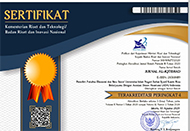SHARIA GOVERNANCE DAN KINERJA LEMBAGA KEUANGAN SYARIAH: FIRM SIZE SEBAGAI PEMODERASI
Abstract
Islamic Banking has astrategic rolein improving the welfare of the people, through theintermediation process of lending and funding distribution activities and the provision of other financial services, based on the principles of sharia. The study looked at the relationship between the application of the principles of Shari'ah governance and performance of Islamic financia linstitutions in Riau. In this study, the performance of Islamic banking financial institutions measuredusing the Balanced Scorecard. The research was conducted on Islamic banking institutions in Riau, both Islamic Banks (BUS) and Sharia (UUS) successfully collected the data by 35 respondents.
This study shows that sharia governance is able to influence the performance of sharia financial institutions in Riau Province as evidenced by a coefficient of 5.008 with a significance level of 0.000 much smaller than the value of α (0.05). The results of this next study indicate that sharia governance is not able to influence the performance of Islamic financial institutions in Riau Province after being moderated by firm size as evidenced by a coefficient of -1.933 with a significance level of 0.071 greater than the value of α (0.05).
Keywords
Full Text:
PDF (Bahasa Indonesia)References
Archer, S., & Karim, R. A. A. (1997). Agency theory, corporate governance, and the accounting regulation of Islamic banks. Research in Accounting Regulation, Suppl. 1, 97 – 114.
Abdussalam Mahmoud Abu-Tapanjeh, (2009), Corporate governance from the Islamic perspective: A comparative analysis with OECD principles, Critical Perspectives on Accounting 20. 556–567.
Aznan, (2002), Optimal Shariah Governance In Islamic Finance, http://www.nzibo.com/IB2/04_01.pdf (10-12-2012)
Black, B., Jang, H., dan Kim, W. (2003) : Does Corporate Governance Affect Firm Value? Evidence from Korea, Research Paper Series,, KDI School of Public Policy and Management, 05/11.
Che Haat, Mohd Hassan, Rashidah A.R. And Sakthi M. (2008). Corporate Governance, Transparency and Performance of Malaysian Companies. Managerial Auditing Journal Vol. 23 No. 8 pp. 744-778.
Darmawati, Deni dkk.(2004). Hubungan Corporate Governance dan Kinerja Perusahaan. Symposium Nasional Akuntansi VII, Denpasar, 2-3 Desember 2004.
Dini, Joko., (2012) Pengaruh Struktur Kepemilikan, Ukuran Perusahaan, dan Corporate Governance terhadap Manajemen laba, Jurnal Prestasi Vol.9 No.1
Ghozali, Imam, 2009. Aplikasi Analisis Multivariate Dengan Program SPSS, Edisi Keempat, Penerbit Universitas Diponegoro.
Grant, Garry H., (2003), The Evolution of Corporate Governance and Its Impact to Modern Corporate America, Management Decisions, 41, 9, 923-934.
Hasan Turabi, (1987), Principles Bank Indonesia, Directorate of Islamic Banking of Governance, Freedom, and Responsibility in Islam, The American Journal of Islamic Social Sciences l Vol. 4, No. 1
Hutagalung, D. (2004) : Pengaruh Penerapan Prinsip-Prinsip Good Corporate Governance dan Sumber Keunggulan terhadap Kinerja Keuangan: Suatu Analisis Terhadap BUMN di Indonesia, Disertasi, Universitas Padjadjaran, Bandung
Hermanson, Dana R., and Larry E. Rittenberg, (2003), “Chapter 2, Internal Audit and Organizational Governance”, Research Opportunities in Internal Auditing, The Institute of Internal Auditor Foundation, pp. 26-71)
Hesti, Diah Aristya (2010). Analisis Pengaruh Ukuran Perusahaan, Kecukupan Modal, Kualitas Aktiva Produktif (Kap), dan Likuiditas terhadap Kinerja Keuangan.Undergraduate thesis (unpublished), Universitas Diponegoro
Kaplan, Robert and David P.Norton. 1996, The strategy Focused Organization, Boston. Massachusetts. Hrvard Business School Press
Nofianti, Leny. et.al (2012) “Principles Of Good Corporate Governance Shari’a Model”, Proceeding ICIAF
Nofianti, Leny.dan Irfan, Andi (2013) “Hubungan Antara Penerapan Model Prinsip-Prinsip Good Governance Syari’ah Dengan Kinerja Lembaga Keuangan Syariah”, Proceeding Simposium Nasional Akuntansi Syariah
Lewis, M. K. and Algaud, L. M., (2001), Islamic Banking. Edward Elgar, Cheltenham, UK.
Maria Bhatti and M. Ishaq Bhatti , (2010), Toward Understanding Islamic Corporate Governance Issues in Islamic Finance, Asian Politics & Policy Volume 2, Issue 1, pages 25–38, January/March
Masri Singarimbun, dan Syofyan Effendi. 1995. Metode Penelitian Survey. Lembaga Penelitian dan pengembangan Ekonomi dan Sosial, Jakarta.
Nasser M. Suleiman, (2000), Corporate governance in Islamic banks, http://sukuk.me/library/education/governance.pdf. (7-12-2012)
Nur hidayati setyani, (2010), Kebijakan pemerintah tentang pelaksanaan prinsip ”good corporate governance” bagi bank umum dalam praktek perbankan syari’ah, program pascasarjana universitas diponegoro Semarang.
Outlook Perbankan Syari’ah, 2013.
Sulistyanto, S. (2003) : Good Corporate Governance: Bisakah Meningkatkan Kepercayaan Masyarakat?, Jurnal Ekonomi & Bisnis-EKOBIS, 4, 1, http:// artikel.us//hsulistyanto1.html.
Sukrisno Agoes, (2005), Penerapan GCG Pada Perguruan Tinggi. Auditor, No. 18
Undang-undang No. 21 Tahun 2008 tentang Perbankan Sharia, pasal 34, 35, 38 dan 39.
Uyun, Shofwatul (2011). Pengaruh Manajemen Risiko, Ukuran Perusahaan, dan Leverage terhadap Kinerja Keuangan Perusahaan pada Perusahaan Manufaktur yang Terdaftar di Bursa Efek Indonesia. Undergraduate thesis (unpublished), Universitas Airlangga.
Thompson, P. dan Hung, C.A. (2002) : Cracking the Singapore Code of Corporate Governance: a Step Corporate Governance Towards World -Class Corporate Governance and Superior Performance?, Research Paper Series, The Centre for Europe Asia Business Research, 9.
Zulkifli Hasan, (2009), Corporate Governance : Western and Islamic Perspectives, International Review of Business Research Papers, Vol.5 No. 1 January 2009 Pp. 277-293.
DOI: http://dx.doi.org/10.24014/jiq.v14i2.6793
Refbacks
- There are currently no refbacks.














